#not in terms of gameplay but decision-making
Explore tagged Tumblr posts
Note
Oh yeah, since Icha is really into Dragon Age, Dragon Age Inquisition is currently up for free in the Epic game store until Thursday next week
Just download the thing, make an account and receive game for free forever
To whom it may concern
oh true!
that's indeed helpful if the free aspect helps.
Here's the link!
I hate Epic Game Store personally (the lack of game overlay like on steam pissed me off with my ff7r copy and it kept telling me i had to be online to play a solo game), but free game is always good game.
tho as a disclaimer if you get interested in DA because of me, do start with Dragon Age: Origins (take the Ultimate Edition, so you also have the Awakening DLC, the in game DLCs, as well as the others post game DLC to play after Awakening, Golem of Amgarrak and then Witch Hunt), and then Dragon Age 2 (again with the In Game DLC, Especially Legacy and Mark of The Assassin to play when the Main Quest's Storyline "The Last Straw" is first unlocked/when Act 3 starts). And then DAI.
Like of course grabbing DAI as it's free is a good thing if you make plans for later, but yeah to me personally DA is the type of games you'd want to play in order.
(DA4 is supposed to come out this year too so. well. jsyk.)
o7 good luck everyone, and thanks anon for that!
#sorry i'm like this i do know people who didn't start with Origins and liked the games#and i know Origins is tough to get through at first because it's the least dynamic gameplay#(though it's the best in term of the roleplaying aspect)#but DAI drops major lore bombs that recontextualize the whole lore of the saga#and there is something so euphorical imo to the moment this drops when you've been just going through the games#like the reveals in DAI left me vibrating for months and i screamed when they happened#the idea of starting with the reveals is just. wrong to me.#*bites fist* also i can recommand the order for the insane people who want to read the comics the books and the guide books too#because i read them all and they rules. I have... taken notes into all of my books with stickers for lore references#it's a sight.#guhh. da......#also it's the type of games where your choices change the story drastically#and change the worldbuilding of each game from one game to the next#decisions you make in the first game will shape some specific questlines/convos in dai as well#da2 especially has a lot of new scenes depending on what you played in Origins#and impact Inquisition so drastically#and some characters from Origins or 2 reappear in 2 and Inquisition and will talk about your previous choices#and it's just so cool man because they can be drastically different people depending on your choices from one game to the next#that's it's just oughhoughhoughhhh#vibrating through the next games realizing 'oh it's my choice 2 games ago that made this questline possible'#is a one of a kind experience. Do play the whole saga if you want to get into DA this is my last messa--#anonymous#ichareply#ichafantalks da
1 note
·
View note
Text

🧠 PLEASE DO NOT PIRATE THE HUNDRED LINE: LAST DEFENSE ACADEMY ON APRIL 24TH 🧠
WHY THO? ➡️ Kazutaka Kodaka has said on many occasions that this is literally make or break for TooKyo Games due to production issues and the resulting debt while making it. The company did not have money for ports or for additional languages, or physical versions in some areas. Additionally, he will likely leave the game industry if it doesn't sell. I suppose that final bit could be a joke, but I'd rather not risk it.
In short: to pirate The Hundred Line is not sticking it to Bethesda's spaghetti coding or EA's nonsensical manufacturing line of Sims DLC, but rather an indie studio.
But we're all short on money these days and shit's expensive. I understand. I get by on an income of lint and those mint chocolates you can eat at the Olive Garden. So while I ultimately can't control what you do, random citizen, I've provided alternate means to pirating on this post.

➡️ "I would like to try the game before buying it."
Here is the Steam demo.
Here is the Switch demo.
Both provide about 5ish hours of gameplay, both story and tactical modes, and it should be enough for you to make a decision.
➡️ "I would like to play the actual game."
Digitally, you can get it on Steam or on the Switch, as stated.
(Good news: it'll also be compatible with the Switch 2!)
Physical copies will be sold in the US and Japan. (Unsure on China.) Take a look online or at your local retailer! There's even a spectacular pre-order package with eggstras.
You can also try joining a Steam Family with a friend who owns a copy of the game. Of course, you'll have to sort-of take turns playing it, but it's better'n nothing.
If you're really desperate, see if you're qualified for a short-term pay-over-time plan from Paypal etcetera. I don't recommend it, but I assume we're all adults here. Make your own financial decision!
➡️ "I don't mind if I just experience the game."
Have a friend stream it for you over Discord or another platform! Pool money if you must to purchase one (1) person the copy.
There's also no restrictions on streams and no restrictions on spoilers, so...
...your favorite Let's Players or streamers might be glomming onto the game ASAP, if you don't mind waiting a bit.
You can also politely ask/suggest that your fave content creators, if they're small enough that they still listen to individual fans, play or stream the game. (Don't be annoying, though, and make sure they're into games like this first.)
➡️ "I would like a physical copy."
See the third bullet under "I would like to play the actual game."
There is sadly no official physical copy for Europe as of writing, so I would look at the other sections if you're over yonder. I believe you can import into Europe, though.
You might also be able to flash a cartridge or USB or CD or something of the digital version if you already own it please. (Don't make a cartridge of it if you didn't buy the game, like. That's defeating the point.) I don't quite know how this works, but I'm putting it here anyway.
➡️ "You're a bootlicker/I am owed this content/sorry Kodaka but I'm built different/Danganronpa sucks and this will too/I'm not giving money to a [racist implication about Japanese culture]."
ok

464 notes
·
View notes
Note
i'm curious why you feel confident in saying that mizuki was trans, it feels like the story itself only explicitly stated that she's amab - i would really like for it to be confirmed but it feels a bit like jumping the gun
If I'm wrong, I'm wrong, but considering how uncomfortable Mizuki is with classmates calling her a boy, and how she's gone out of her way to not have N25 know this, and how she reacted to Ena being asked "If you're friends with Mizuki, are you [a cis girl] a boy too?", idk man I think I can jump the gun.
Plus everything in the trans Mizuki post. The blatant use of the trans flag colors, people calling younger Mizuki "weird" and asking "isn't it odd for you to wear that" when she goes into school in typically girly clothes for the first time, Mizuki having short hair and boys clothes in middle school but long hair and girls clothes in high school, her sister encouraging her to stop repressing and live her life on her own terms.

Like. This is Mizuki's reaction to classmates telling Ena that Mizuki is a guy. It's the fact they asked a cis girl if she was a boy to try and justify why she was friends with Mizuki. Like there's some sort of implication there that they think Mizuki is pretending to be a girl. Yeah sure maybe they'll turn around and say Mizuki is a crossdresser despite everything, but Mizuki being told "isn't it weird for you to dress [like a girl]", "it's just for attention" "it's just a phase". It resonates so much with the trans experience, these are word for word things that trans people hear, and then you can couple that with clpl saying they aim to portray their character's struggles realistically.
Like. Let's get this straight. The boys who ask Ena if "[she's] a guy too" are presumably the same ones who have been showing up in the story since the beginning, being portrayed as bullies. Them calling Mizuki a boy, and making fun of her for dressing in a feminine way, is presented as bullying. Going off that translation doc since sekaibest still doesn't have the script, they follow up that scene by saying that Ena is a "normal girl". Normal is the key word here. Ena is a "normal" (cis) girl to them which implies they view Mizuki as an "abnormal girl" (trans girl), or they outright just call her a guy. Yikes.

Again. Mizuki's reaction to the bullying speaks volumes. Mizuki had gone through such lengths to hide this from her friends. It feels way too much for them to just say she's a gnc cis boy at the end of it. Listen, if gender wasn't related here, she wouldn't have nearly this much issue with her friend being told she's a gender the story has repeatedly proven that she doesn't want to identify as and have other people identify her with. Simply from the perspective of a screenwriter.
...also mizuki is literally grouped as a girl for gameplay purposes and always has been? And ensekai at least at launch made the executive decision to use she/her for Mizuki.
But if I'm wrong, I'm wrong.
#asks#project sekai spoilers#if people want a gnc cis boy there's literally toya go read take the best shot#can you guys stop being mean to anon they did nothing wrong they literally said they want trans mizuki to be canon#this is me disproving the claims of people who still think she's a cis boy (thus proving her trans) it's not directed at anon
437 notes
·
View notes
Text
The sims 4 is not a lost cause, it just needs some love.
SO i recently came back to playing sims 4 after a long hiatus and i have to say i'm surprised. I'm no EA apologist, they are indeed cashgrabby. But to see that lots of new features were integrated over the last few years that facilitated different styles of gameplay actually surprised me.
It seems tho that a pattern has been set, were they will release the most lackluster pack (whatever it is) and keep fixing it over the next few years. Pack reworks became a thing and thank god for it, since the releases don't seem to be stoping in order to give us better results.
It's a bittersweet feeling for sure. The game has more than 70 packs released and somehow it can still feel dead when it comes to live mode. And that's what this post is about: how could they bring the love the other games had for live mode in a base game that's so purposefully made for cas and build/buy?
Part 1: Nostalgia driven gameplay

Seeing the UI from the sims 1, 2 and 3 brings me back a lot of memories. It was a staple to this series that was lost due to a cleaner redesign. Not only that, but a core mechanic was also changed: the wants and fears system.
I believe that what makes me so nostalgic is TO KNOW that this worked so perfectly and hardly needed any refreshes.
Your sims now have emotions and yet, they rarely feel like something integrated to a goal or something you can truly affect while in gameplay.
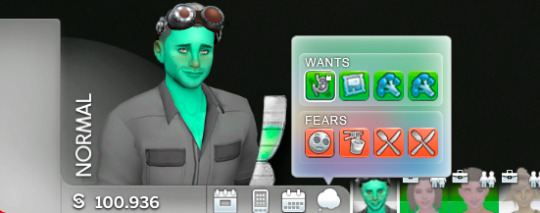
Bringing back the wants and fears system would not only make our decisions during gameplay more impactful to our sims emotions, but also help to choose the direction any story could go.
An aspiration meter that's connected to the rewards shop would make decisions much more impactful (rather than getting them just by working through what is currently known as the "tutorial aspirations").
Your sims moods should be important, and so what makes them feel that way.
Part 2: World overload
With the amount of packs released, the world selection menu quickly became a problem. When seeing that screen, it all just feels like a blur of information that's been set in a certain way for convenience.
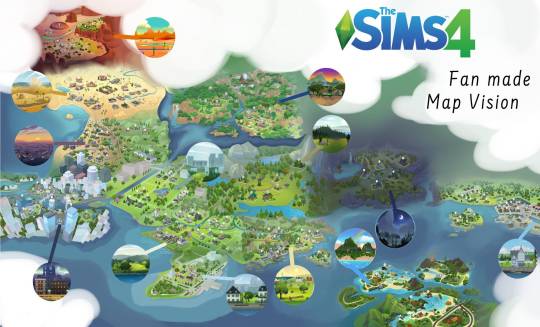
Maps such as these became popular in the community for a reason. The experience of playing needs to be inviting from the get go. It's clear tho that the reason behind not giving us something like this is no long term planning and pack exclusive experiences.
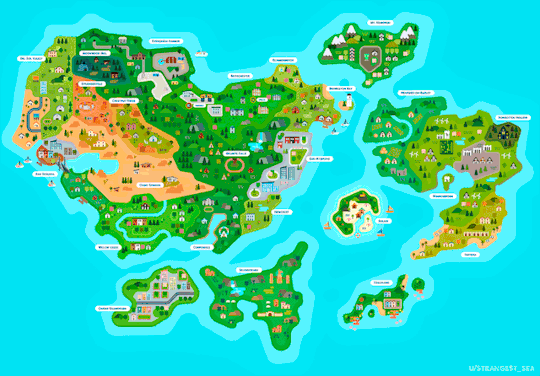
So what if it just became a larger sims world? A concept were you wouldn't select the city at frist, but the entire region were it is located in order to acess the one you prefer.
That would also make this refresh friendly to a future create a world tool (whenever that may come).
Part 3: Pack refreshes are the bread and butter of the future
Let's face it: we're stuck with this game for another 10 years at least. So other than dwell on the fact that we don't have open worlds or things of that nature, we should look at what can reasily be solved, and that's pack refreshes.
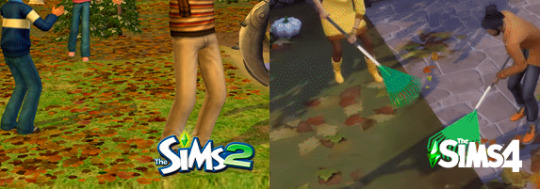
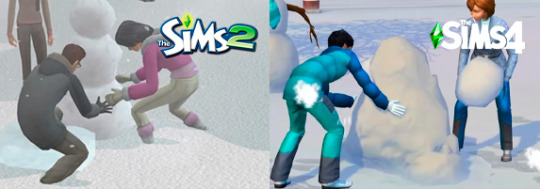
From seasons coming out without properly made textures and snow depth to functions that will simply not work as they should, I like to believe we do have a voice in this community. I made this post several years ago and now, looking back at it, I see so much improvement over things that we were desperately asking for.
Don't get me wrong, by that I don't mean that EA developers are searching through my page or yours to find what we think and expect for The Sims 4. But talking about these things openly as a community is what makes the difference.
Part 4: Simmers Unite
In conclusion: uniting our voices to ask for these things to come as refreshes and revamped features are crucial for the next few years. Let's, together, avoid a "my first snowdepth pack" or similar things that could yet come our way.
I created a blog called @sims4-communitywishes to reblog rants and wishes such as these. Our blogs and separate voices may be small, but a repository of it is much more impactful.
So thank you for reading this all the way through and in case you want to share your wishes for the future of The Sims 4, tag it as #s4comunitywishes
331 notes
·
View notes
Text
I think a lot about the Concept of ‘choices that matter’ in video games. Like, in terms of what it is that makes a choice ‘really matter’, what do we perceive as a choice that matters or has a consequence, how do different games with different amounts of branching or non-branching storylines play with those ideas… Especially because Undertale is one of my favorite games of all time, and it has often been hyped as ‘a game where your choices REALLY matter’ and… honestly, I dunno if all of this hype was fully conducive to Undertale. Because the way it handles the concept of Video Game Choices is actually a lot more interesting and complex than that simplistic descriptor makes it seem.
Because Undertale actually has a lot of choices that ‘don’t really matter’! Lots of dialogue choices and silly little decisions that on a first playthrough seem like they’re some sort of moral choice or a branching plotline but end up always leading to basically the same result regardless of what you do!
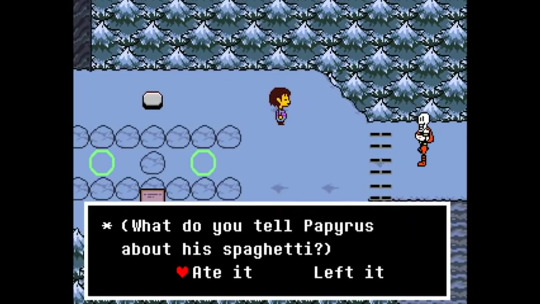
And the game doesn’t really try to hide the fact that these choices are kinda 'Fake'. I mean, on a first playthrough a player might assume there’s gonna be some Massive Consequences for picking the ‘wrong’ drink on Undyne’s date, but the game’s narrative expects for there to be multiple playthroughs and pretty much every Choice that Doesn’t Matter is peppered with that Undertale brand of wacky character-focused humor that inherently makes the moment memorable. Papyrus leading Undyne straight to you no matter what you do is basically a cross-timeline running gag.
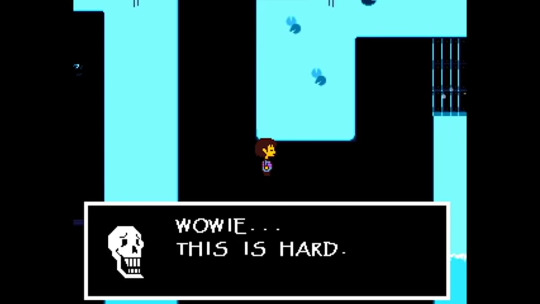
On some level I see this as a sort of gag that serves as meta-commentary about the expectations around Choices That Matter in Video Games. As in, a lot of games have their Moral Choices happen in clearly easily marked ‘this is a Moral Choice!’ moments within the story, while the actual gameplay (and any violence the player might cause as part of said gameplay) is basically entirely divorced from any element of narrative-branching and doesn't effect the story at all. Undertale basically entirely inverts this dynamic; the most important factor for which Route you’re own is how you handle your FIGHTs, and what seems like clearly-marked and obvious Moral Choices are just goofy insubstantial minor changes in dialogue.
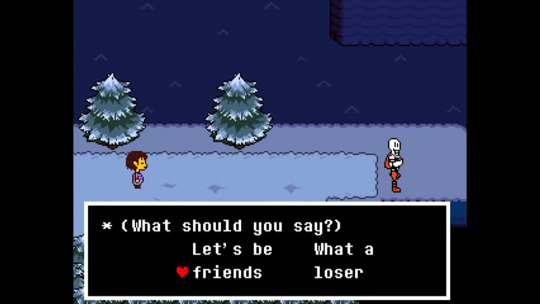
But also… there is also a level where you must ask yourself ‘what does it mean when we say that these choices Don’t Matter’. I mean, it’s not like they didn't change anything about the game, the Player still made the character say that other thing, the choice probably led to an alternate piece of dialogue, probably a joke with a call-back at the end of the game… The line between a one-off joke and an actual story-changing moment can be a little blurry if you look at it too deeply.

For example, near the end of the Waterfall part of the game, the Player is given the choice to save Monster Kid even at the risk of having to face down Undyne.

Pretty much anyone who isn’t deliberately trying to be an asshole is going to rush to save them and obviously that includes the Pacifist Route Players. But you can actually leave Monster Kid to die without it 'mattering' in the sense that it wouldn't divert you from the Pacifist Route. Undyne saves them instead of you, and ends up with slightly less HP for her battle (which might Matter for Runs when you try and FIGHT her but obviously not in Pacifist Runs) and… by the end of the game, during the extremely happy True Pacifist Ending, they still clearly remember that you abandoned them and are upset by it.

So… does saving Monster Kid ‘matter’ or not? On one hand, choosing not to save them mostly just changes a few lines of dialogue but… these lines of dialogue kinda recontextualize this happy ending and the Player’s actions in general. Despite the True Pacifist Ending otherwise portraying the Player/Frisk as a kind-hearted and brave hero... they still did this undeniably cowardly (and perhaps even cruel) act to one of their friends .
Was running away and leaving Monster Kid to die a brief but significant moment of weakness that the Player regrets and has cost them what could’ve been the start of a lovely friendship? Or is that simply that being a True Pacifist was always more of a matter of pragmatism rather than ideals? Were they only acting as a Pacifist to get that promised 'Best Ending', and only Monster Kid has an inkling they are not as heroic or kind as everyone thinks they are?
And then there’s the Snowman ‘quest’.
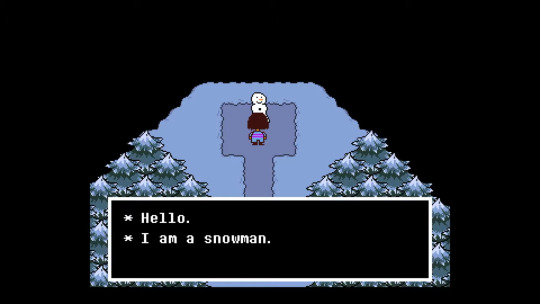
A free healing item given early in the game, with your mission being to carry it along in your inventory for as long as you can without ever consuming it. The only reward you will ever see from it is a few lines of dialogue…

But for many, it is more than enough of an incentive to preserve the Snowman’s Piece. You can do whatever you want with the Snowman without it ‘mattering’ in terms of Ending or consequences. You could carry it through all of your adventures with care and kindness... or you could eat it while he can’t see you and then go back to him and tell him that you ‘lost’ it and then get another piece and eat that as well, you could eat it right in front of his face, horrifying him.

And much like with Monster Kid, you can STILL get the True Pacifist Ending after doing that, all that would change is a few optional pieces of dialogue from the Snowman…

And a total recontextualization of the Player’s behavior and the ending. The Snowman sees the Player as a cruel and heartless person who is just pretending to be good so they can be liked - the way they acted with this immobile, powerless Snowman who could do nothing for them and their reputation reveals their true self. And he says their friends will realize that too one day...
Doing a True Reset on the Pacifist Ending is, by definition, a (almost) consequence-free action and yet it changes future Pacifist Routes immeasurably. Turning the Player into a Hypocrite doing the exact same thing they were trying to stop Flowey/Asriel from doing - trapping all of their friends into a time-loop so they can play with them forever while never actually letting them to enjoy freedom on the surface, simply because they are not willing to move on or put their friends' wishes and agency above their own. Nothing in the game actually changes, not one character can even suspect that you did something like that, and yet for the Player - this choice makes the entire Meaning of the game flip on its head.
Even the most famous and heavily-toted Big Consequence in the whole game - selling your soul to Chara after completing a Murder Route… mostly what it does is just… recontextualize the ending of the Game.
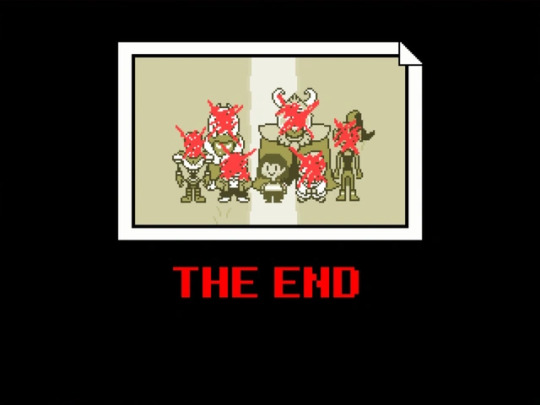
As a game, ‘Undertale’ is very much about the ways in which a Player engages with a game can radically recontextualize it. The huge chasm of difference between the Pacifist and Muder Routes is just the most literal example of it. But, in a way, even the tiny little Dialogue Options - where the lack of real choice and consequences is Obviously a Joke - matter. Because of the way they can recontextualize the Player Character’s behavior.
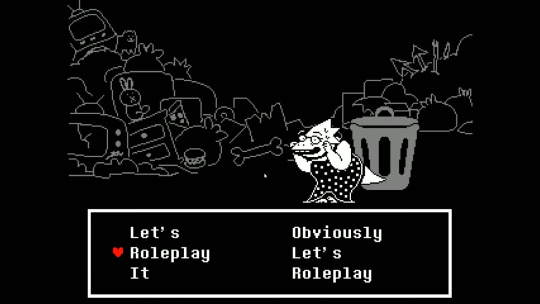
(Okay, maybe not this one, but hear me out…)
Do you trust Papyrus to not betray you, even after you spied on him with Undyne?
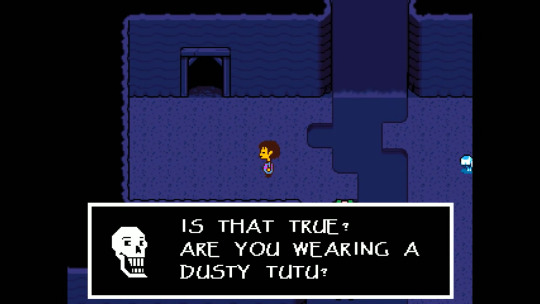
Do you have the integrity to admit you forgot something or got it wrong even when there’s no consequences for just lying about it?
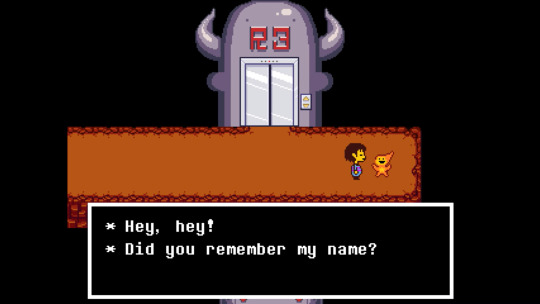
Are you a hypocrite for trying to get Alphys to be truthful with Undyne only to then immediately turn around and lie to Undyne yourself?
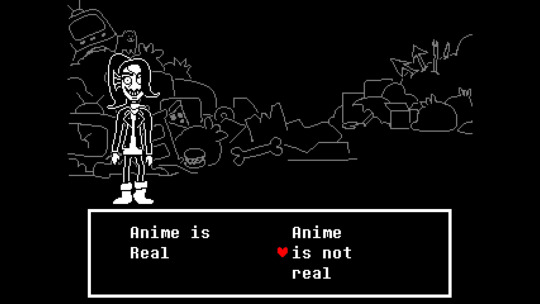
None of these choices matter for the ending, some of them don’t even get, like, a call-back joke or anything, but… if you are engaged in this story as a narrative, if you are invested in these characters as if they were people, if you are honestly trying to be the best person you can be, if you are trying to self-reflect at the way you approach this game… even the silliest little dialogue option can suddenly be imbued with deep implications and you can make them matter.
Undertale is one of the best demonstrations of this concept, but this is absolutely not exclusive to it. For example….
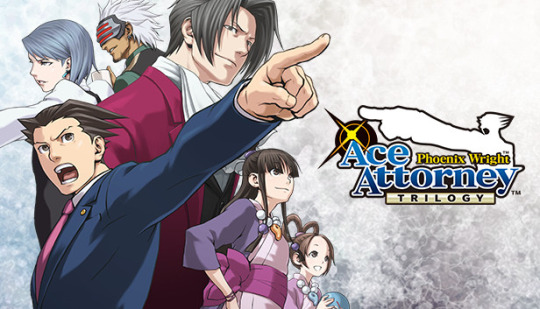
‘Ace Attorney’ is pretty much as far away as you can get from a ‘branching narrative’ within the video game sphere. It is a heavily-linear Visual Novel where 70% of the time it won’t even let you talk to random characters at anything but the exact order it expects you to and any ‘Bad Endings’ are basically just glorified Game Over Screens. (... because this is the Internet and something something piss on the poor, I should probably specify that I am talking about ‘Ace Attorney’ because I love Ace Attorney and these are neutral descriptions of the game and not complaints. There’s nothing wrong with a game being linear.)
If there’s any Dialogue Choice in AA, it’s generally a very basic ‘right answer-wrong answer’ choice between Progress and a Penalty, or a total non-choice that just gets you to the same final result regardless. Except… Well… as we just talked about, getting to the same final result doesn’t necessarily mean a choice is ‘meaningless’, does it?
There’s actually a lot of great storytelling moments where Ace Attorney, despite its otherwise strict linearity, uses this exact sort of recontextualizing mindset I’ve talked about with Undertale to make choices with some really powerful emotional impact…. Even if technically, the ending is the same ending. It can be something as basic as ‘even if picking this Wrong Answer doesn’t get me a penalty, it still embarrassed my character and disappointed my friends/rivals and thus I feel bad for picking it’. Consequences as recontextualizing your character as more incompetent than they should’ve come across at that moment.
And then there’s moments like the iconic ending of ‘Justice for All’. That moment before Franziska bursts into the Courtroom with the case-making evidence and saves the day. The moment where it seems like Phoenix really is gonna have to pick between protecting his best friend and carrying out a rightful sentence.

The player gets to pick between the two options, but Phoenix never gets to say his choice out loud before Franziska comes running in... and yet… he, and the player, still made that choice. Even if no one ever has to experience the consequences of your choice, even if the rest of the world has no idea what Phoenix Wright would’ve chosen if the Miracle hadn’t happened, we know what we picked and that knowledge of the choice matters. Because of how we feel about this choice and what it says about our interpretation of Phoenix… and about us.
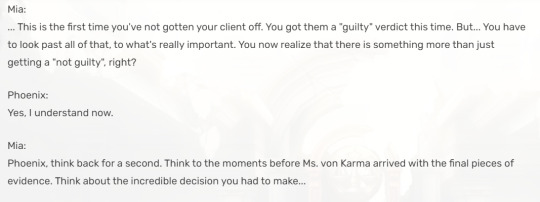

There’s also a bit of this ludonarrative device in ‘The Great Ace Attorney: Adventures’. During “The Adventures of the Runaway Room”, when you investigate the Omnibus for the second time and start finding things that… don’t quite fit together. When you’re finally starting to make progress with proving McGilded’s innocence, while also maybe starting to notice that something is… wrong with these pieces of evidence.

The unchanging linear narrative of the game is that Ryunosuke does eventually realizes McGilded's trickery, puts truth ahead of victory in court and yet, despite his effort and good intentions - the case still ends with a false Not Guilty verdict. And yet, the Player has the choice to... tweak the details.
There are several points where Ryunosuke can object, where he can call out the inconsistencies even though they help his case, where he can support Van Zieks in his accusations of tempered evidence... or he can not. Not necessarily intentionally misleading the Court as much as subconsciously trying to ignore the inconsistencies in the name of trusting his client.

And yet… in the end it doesn’t matter. Maybe Susato calls out the inconsistency instead of him, maybe Van Zieks does, maybe it remains uncontested but... no matter what you do, the case will end with a Not Guilty verdict (I mean, I guess you can deliberately fail the game but that will not progress the plot), McGilded doesn’t seem like he held a grudge (in the few minutes he had left to live), and a few cases later - Ryunosuke would always be punished for his part at this false verdict.
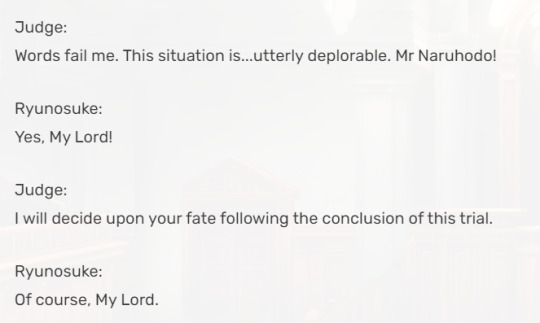
So it doesn’t really matter what Ryunosuke did back then? Does it matter if he did his best and called out every single inconsistencies or if he kinda half-assed it until he (and the Player) had to? He’s still going to suffer the same consequences down the line. And yet….
And yet, I think there’s something so powerful about giving us that option. About knowing that Ryunosuke, and we, did try and do something about McGilded's dirty tricks- even if it didn’t work. Or alternative, knowing that there was more that Ryunosuke and us could’ve done even if it was not nearly enough. Even if in the eyes of the game and the British Justice system there is no difference, the fact that we know what did and what we could’ve done can radically change the way the player feels about all of the later scenes concerning the truth about McGilded’s trial. It can radically change the way the player interpret Ryunosuke’s feelings about it as well.
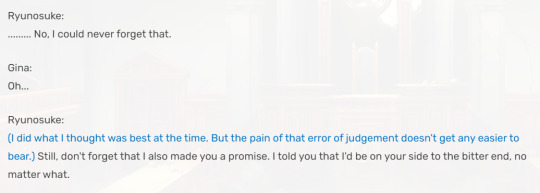
Because even though the game itself keeps playing along with the same script regardless, that trial had irrevocable consequences for the Player.
#undertale#ace attorney#ut#utdr#undertale analysis#undertale meta#ace attorney meta#the great ace attorney#under tale#tgaa#tgaac#dai gyakuten saiban#tgaa1#gaac#great ace attorney#aa2#justice for all#aa jfa#ace attorney jfa#farewell my turnabout#ace attorney justice for all#aa justice for all#phoenix wright#ace attorney trilogy#aa trilogy#phoenix wright trilogy#pwaa#phoenix wright ace attorney#gyakuten saiban
809 notes
·
View notes
Text
Touchstarved Origins
Okay, so there's been a lot of divisive opinions over the replacement of 'The Hound' background with 'The Exile' background. I have my own thoughts that I wanted to express on the situation, as well as the origin system as a whole.
TLDR: I'm not against 'The Exile' existing, but I do think it's the least interesting and the weakest of the four backgrounds. I'm also firmly against the replacement of 'The Hound'. I also want to talk about how I would add/fix the current backgrounds. Also these are just my opinions - I'm not speaking objectively.
Spoilers ahead!
What's the point of the Origin system?
There's two main reasons for the current origin system.
First of all, each background has a 'perk', which each background can gather different types of information about the world and the love interests. This info may effect player decision-making.
Secondly, the backgrounds allow for roleplay and MC creating. This aspect is a huge part of the fandom, and RSS encourages people to make OCs with the backgrounds as a 'guide'.
How well is Origin system implemented?
I think it's important to keep in mind that it's only a demo out right now. That being said, as of these demos, I do not think the origin system has been implemented very well.
The 'perks' the backgrounds give and the story/dialogue differences are pretty minimal. This means that the way the Origin system currently works, the don't really meet the intentions behind the backgrounds.
The Exile & The Hound
Welp, onto the issue that inspired this post. First of all, I believe that 'The Hound' shouldn't have been replaced at all. IMO it was the weakest in terms of implementation, but that doesn't mean it should have been removed, just made better.
People have been building their MCs/OCs for years at this point, and it's straight up not fair for people to have their backgrounds taken away for seemingly no reason. There was no communication from RSS or even a survey from RSS asking about changing up the backgrounds.
I've also seen people say the backgrounds are 'similar enough', which I can't fully agree with. They're both survivalists, but the contexts are just too different - One is survival in in a socal world, and the other is survival in 'the wild'. Also, I think the biggest appeal to a lot of people about 'The Hound' was the criminal edge and the social intuition, which in a game about character interaction, is a big loss.
There's also the 'balance' of the original three backgrounds. While I don't think the OG backgrounds were the epitome of character building, they were different in the 'right' ways. For example: 'The Hound' is street-smart and familiar with lowtown's entertainment district, 'The Alchemist' is book-smart and somewhat familiar with lowtown's entertainment district, and 'The Unnamed' most likley has some education and isn't familiar with lowtown's entertainment district. They've also all been betrayed, which adds on to their desperation. This also means they learn different information that is relevent to the LIs (eg, 'The Unnamed senses familiar about Kuras, but 'The Alchemist' notices no magic from the reattached limb).
So, what about 'The Exile'? Backstory-wise, there's the isolation of 'The Unnamed' and a parental figure of 'The Alchemist', but no 'betrayal'. It does take some the the social intuition stuff from 'The Hound' (eg. "I've learned to recognise a leader when I see one" about Ais) but for a character that's described to live away from other people (apart from the hermit), it doesn't really fit or make sense. The 'perk' of an 'uncanny intuition' is very similar in flavour to 'The Unnamed' - I can't see why 'The Unnamed' wouldn't also have the red choice to 'move immediately'. 'The Exile' is also fluent in multiple languages, but that seems like something 'The Alchemist' would know.
In short, 'The Exile' feels like a mish-mash of the original backgrounds, lacking a strong identity - both storywise and gameplay-wise. It has qualities that already belong to a background or qualities that should belong to another background. If the goal was to have more 'cohesive' backgrounds, we ended up with a redundant background.
That being said, I do think there's a place for 'The Exile', but as it is right now, it needs a major rework.
Sidenote, blind/new players of Touchstarved aren't going to know what soulless are when selecting the backgrounds, so making it a 'selling point' of the background isn't a great move.
Things I Would Add to the Backgrounds
These are just some moments I could see happening with events that happen in the demo + feel in-tune with the background.
'The Unnamed':
I'll note it's hard to think of moments for 'The Unnamed', since we lack information on how their religion and temple function.
I think 'The Unnamed' should be the weakest fighter out of the backgrounds. Should probably never feel comfortable in altercations.
Should be the most 'aware' on what their curse does to people. Could come with different dialogue during Mr. Chocky's scene or Leander's 'hold back' scene.
Just more references to 'The Unnamed's' old faith. It was such a big part of their life, that it feels wrong to know so little.
Less knowledgeable of 'normal' society. They say the entertainment district in unfamiliar to them, but we don't actually see them go about the place much differently. For example, they shouldn't assume Vere is a sex worker because of the 'parted pink curtains'.
'The Hound':
I actually don't think 'The Hound' needs to be some super proficient combatant, but they should be the most compatent when caught off guard and general 'physical' situations. For example, they don't get knocked to the floor by the 'lowlife' in the bar, and/or their escape from the soulless is more skilful (not just trying to open a door and failing). Mhin would still show up of course.
Let. Them. Steal. The best moment I can think of is after they left Kuras's clinic, they pickpocket someone and use the money to buy food. I think it would make sense because they're already thinking about money in that scene.
Related to the last point, but 'The Hound' should be the most 'comfortable' finanally. Unlike the other backgrounds who have likely not been finanally responsible for themselves, 'The Hound' is used to poverty and low spending power (since most of the money they did have was for a cure). And of course, they have the means to steal. Maybe alter MC's lines about being worried about money.
'The Alchemist':
Not a great physical fighter, but as they get more settled in Eridia, having 'The Alchemist' preparing things such as protection enchantments. If taken off guard, they'll be weak, but if they can prepare for an encounter and such, they'll be in a better condition. That's to say, I don't mind them being 'weak' in the demo.
Some more general history stuff. For example, 'The Alchemist' thinking about how old Eridia is.
'The Exile':
I think if you're going to add a choice to fight the soulless, and a new backgound that's 'familiar' with soulless, I think it's fair to say the MC should have lived in the encounter. It's not like Mhin wouldn't have swooped in to kill the soulless anyways.
Final Thoughts
I do hope RSS come out and explain why 'The Hound' was removed, since I doubt they can add it back in without adding a lot more work the finished game. This also isn't made as a dig at anyone who likes 'The Exile', I just have a Thoughts™.
Also, please tell me if I've missed anything I should have mentioned or if I've said something incorrect!
115 notes
·
View notes
Text
IGN - 'The Expanse: Osiris Reborn Interview: Just How Mass Effect Is It?'
"The Expanse: Osiris Reborn looks so Mass Effect that some are already calling it Mass Effect: The Expanse. Based on the debut trailer and what we know about how the game works, it’s easy to see why. And to be fair to the developers at Owlcat Games, they’re wearing their inspiration on their sleeves. In an interview with IGN, creative director Alexander Mishulin and head of publishing Andrey Tsvetkov are up-front about the influence BioWare’s sci-fi series has had on The Expanse: Osiris Reborn. But, they insist, it’s more than just a carbon copy."
Rest of post under cut due to length.
"As for fans of The Expanse itself, Osiris Reborn is an exciting project as it offers a new story that sees some of the actors from the much-loved Prime Video series reprise their roles. Owlcat won’t say who exactly (I tried!), but at least we know there’s more The Expanse coming for fans still missing the show after it ended in 2022. In fact, for me, there’s even more to be excited about when it comes to The Expanse: Osiris Reborn. I’m a big Mass Effect fan, I love The Expanse, and I love Owlcat’s Warhammer 40,000: Rogue Trader, which is not just one of the best Warhammer 40,000 games of recent years, but one of the best cRPGs around. Is Osiris Reborn the sweet spot in the middle of a venn diagram of Mass Effect, The Expanse, and Warhammer 40,000? Read on to find out just how Mass Effect The Expanse: Osiris Reborn really is."
"IGN: This sounds a lot like Mass Effect to me, even down to the mechanics and gameplay. Is that fair to say? Alexander Mishulin: Of course Mass Effect is a huge inspiration for the team. It was one of the biggest games of that time, of Xbox 360. It was played from cover to cover by many team members. Being game developers, it's part of our dream to build something like the thing we experienced while we were kids and that made a great impression on us. So in part yes, but while still having Mass Effect as an inspiration, it's still very much an Owlcat game. It's our story with choices and consequences. It's more grounded and realistic. It's also mechanically more modern. And while it still has a similar target in the audience, we are providing more choices and we are more focused on a modern approach where you can make your own playstyle, make your own experience through the game, which separates us in many ways from the mechanical decisions of Mass Effect. In terms of companions, we love companions. We love the companions in Mass Effect, and we want to give them more spotlight. We want to provide you with more opportunities to see them in action, not only in a Suicide Mission, but in most of the missions to see how they can help you go through, or maybe experience some stroke of bad luck and you will go and help them. So they’re a bigger part of the story and, in our opinion, a bigger part of our team. We cannot deny it's [Mass Effect] an inspiration, but it's still our own game and our own dream to make a game with similar feelings and bring it to our modern audience."
"IGN: Who do you play as? Alexander Mishulin: You play as a mercenary, and there is a twist to that. When you are creating a character, you are creating a character with a sibling. As in real life, while you are similar to your brother or sister, you’re still very much different. So when you're creating a character, you start as a mercenary. I can't talk a lot about the story, but you will get in a not really great situation and will start to try to get over that. And also mechanically speaking, when you're creating your own character, you can start creating your own playstyle. You can choose from more pre-generated characters that are thematic to various parts, like being a sniper for example. You can also mix and match everything and create something of your own that is more fitting to your character, or just more fitting to the way you play the game. IGN: And is it like Mass Effect where you can create a male or female character who is fully voiced? Alexander Mishulin: Yeah, the game is fully voiced, also with the main characters. You can create male and females. There is a very robust and expansive character creation with a lot of options to choose from. Nice hairstyles, nice features, everything you would expect from modern character creation."
"IGN: You’ve said you will meet some of the characters people know from the show. Can you say which characters from the show people can expect to meet? Have you got any of the actors? Are they based on the likenesses of the actors from the show with voice work? Alexander Mishulin: We can confirm that there will be actors from the show. But at this time I can't say the name of the characters or the name of the actors. I'm sorry. IGN: But that's really exciting because they're reprising their roles, aren't they? Which given the show has ended will be exciting for fans to see them again. Andrey Tsvetkov: Absolutely. As Alex has mentioned, some of the actors will be returning to their iconic roles and you will see them in the game."
"IGN: One of the things that Mass Effect was famous for was being able to romance your party members with sex scenes. Is that something you have in your game? Alexander Mishulin: Of course. Companions are a huge part of our games. And in all of our games we had various interactions, including romances, and there will be romances in this game too. I can't go into the specifics of which particular characters, or which particular romances of course. But such interactions will be present. As for companions, as I already said, your sibling, either brother or sister because this character will have the same gender as your character — so it's either two brothers or two sisters — you can think about this character as your first companion and most loyal companion from the start. As for other companions, we are not going into details on them, but they represent specialists and professionals from different fields of knowledge. And of course you'll be meeting Martian characters, Earth characters, and Belter characters. All of them will be part of your team, and this will add additional dynamic inter-relations. Because as you know, a lot of events in The Expanse are politically charged, so you can expect some of your companions to have strong opinions about your decisions regarding the politics and allegiances to particular factions."
"IGN: You’ve said the game will have zero-g sections where you go out on the hull of spacecraft. Some of the best moments of The Expanse show were the zero-g scenes. It’s a grounded, hard sci-fi universe, an adult show with gore, nudity, and sex. Will the game be similar in tone to the TV show? Alexander Mishulin: Yeah, The Expanse is very much an adult game with all of those themes, with difficult and tragic moments. Being a cover shooter, you can expect that there is a lot of graphic violence. So yeah, it's very much on par with the show. But in terms of tone, we are exploring The Expanse from a little bit of a different side. You will be seeing dark moments, but you sometimes will be seeing light moments too, because it's not only doom and gloom everywhere. So you can expect to see the more ordinary life of the people of the various factions. Even in the hard situations there are times when people just rise up and become successful. And so you can expect to see the hardship of the Belt characters, but you can also see some of the Belt characters who become very successful and rather powerful. It's our understanding of The Expanse universe. And it's also — sorry for the tautology — it's expanding the setting itself, allowing you to see some of the locations you know from the shows or from the books in different states or in a different light."
"IGN: This game sounds very ambitious and a step up from what I know Owlcat for. It’s described as a AAA action RPG, Unreal Engine 5. When you have comparisons to Mass Effect, people will think of this as a flashy, big budget sci-fi adventure game, which is on a level we've not seen from you as a studio before. It would be great to get some insight into the scope of the project. How have you gone about changing the way the company works to be able to do something like this and meet expectations, which will be high? I know it's hard to say how long the game is, but is this a shorter, tightly constructed linear game? Alexander Mishulin: Yeah, it's a huge step up and a big change to everything in the way we make a game, because all of our processes are really reimagined for this game. But in a lot of fields our expertise allows us to make the step, to take those risks. For example, we are pretty sure about our storytelling, about how we depict characters, depict choices, and provide you with those choices and consequences. When you have this basis, building up on that to make dialogues more cinematographic, make more cutscenes that involve the player and immerse them into the atmosphere, is far easier because you already know how to tell the story, you already know how to present those characters. So we are building up on our strong sides and expanding them to allow us to build this kind of game. And also we of course expanded our own team as well. We hired a lot of professionals, including the people who were working on other AAA titles similar to those, especially on Cyberpunk. So we are building up on their experience as well. In terms of scope of the project, of course it will be smaller than, say, Rogue Trader, which is an immense adventure. But you can still expect most of our staples. So it's not a linear adventure. You will be traveling through the solar system and you will be able to select whoever you want to go on that mission, or do you want to go and help your companion or continue along the story? Time is sometimes also a factor, like if you go into the location earlier or later, something will change and your previous decision will affect the location as well. So all this intricate storytelling is very much in place and you can expect us to deliver on that. It especially works well with the politics, because there are three factions and there is a political game you will be slowly dragged into, and as you start to realize it you understand you can go with it and champion some of the factions, or you can betray them and be a double agent and learn the secrets and sell those secrets to other side. So all this dynamic is in place, but in a shorter adventure. And this adventure is far more cinematographic. That is one part of the reason it is a little bit shorter, because we are trying to bring more action to life, more choices to life. We are not telling it like it was in a book where you read a lot, but you will see a lot of the things that were previously just written with your own eyes, and that requires a lot of effort."
"IGN: Do you have a release window in mind? How far along is the project? Andrey Tsvetkov: Obviously we have a release window in mind, but we won't be sharing it today unfortunately, just because there still might be room for wiggling a little bit, and we will be saving this one for later. What we can say is that we've been working on this project for quite a while now. We started pre-production in 2022. We are not rushing this, right? We are taking our time to do this in the proper manner and we are very excited about how it's actually shaping up. But we will take our time to finish it and we'll be sharing the information about the release window when we are absolutely ready and we are absolutely confident that we can deliver the experience we want in this specific time window."
"IGN: I've got one last question. In the world of The Expanse, humans struggle in space and space travel is difficult. Do you have any mechanics that challenge the player to cope with being in space or space travel in the same way we see in the books and the show? Alexander Mishulin: We actually thought about adding that to the game and even designed some of those. But we decided that we will show those things, we will tell you about those things, but we will not let you play them or manage them because it leads to additional tediousness and draws your attention away from the story and characters. And we want our focus to be very much on the story and the characters. So you will be seeing them, seeing all those elements in cutscenes. You will be seeing the moments when the Juice is coming in and the chairs go into the flat positions. You will be seeing ships that either accelerate or decelerate. You will be seeing all the somersault maneuvers and everything. But you will not be driving the ship by yourself. Of course all the trajectories for space travel will be realistic, not like going straight but taking into account gravity and gravity wells and going around the planets and everything. We are in The Expanse so we're very much grounded and bound by realism, but we don't want realism to take a lot of fun from you. Just sometimes a little bit of fun, but not a lot of fun! But you can expect some of the flesh physics to be in play. Just an example, of course when you're having a shootout in a zero-g environment, the blood will perform in the correct way, not just splattering on the ground. There are a lot of such small details everywhere. The Expanse: Osiris Reborn is coming to PC via Steam, Epic Games Store, and GOG, PlayStation 5, and Xbox Series X and S."
[source] <- there is some concept art at the link
66 notes
·
View notes
Note
As someone who only recently got properly into Magic this year my stance on the recent UB Standard legality is that so long as the mechanics are good, fun to play, and work well with the other Standard legal sets then I don't particularly care if Final Fantasy is legal.
But.
There is something about the Marvel Universe being Standard Legal that feels off. Final Fantasy shares many aesthetic and gameplay similarities to Magic that make it slide into the general ecosystem better from a Look/Feel perspective. Meanwhile, as much of a Spider-Man fan as I am, it is going to be incredibly weird seeing Peter Parker or Miles Morales face off against the critters of Bloomburrow, even more than Thunder Junction or Duskmourn do.
I will attend the Final Fantasy and Spider-Man prereleases because I love playing Magic and I am interested in both sets, but I cannot shake the feeling that this decision makes the overall play experience strange, especially since SIX Standard sets of a year is way overdoing it (maybe 3 In-Universe sets and 1 UB set would be a better balance?)
I understand the decision from a logical standpoint but the emotional reaction to Magic losing some of its Qualia is something that I can't ignore
I have read many of the responses to my request for emotional responses yesterday (I will continue reading - there are just a lot of people sharing). A common through line is the feeling of loss, that the decisions we’ve been making are taking things away from them.
So, I wanted to take a moment to talk about something that I believe Universes Beyond is adding to the game. I’m not talking about value to other people that aren’t you, but something that is upside to the enfranchised players that are the backbone of the game.
As I’m head designer, my focus is on mechanics and the core gameplay experience of playing the game. Universes Beyond has been a bolt of energy for the design of the game.
Because so many of you are sharing personal stories, I’ll use my own experiences as a way to illustrate my point.
One day, when I was seven or eight, I woke up and went downstairs to see that my Dad had bought me a comic book and left it out on the counter for me as a surprise. It was Spider-Man.
I must have read that comic ten times. It was the start of a life long love of comic books. I’m not quite sure why the superhero genre, in particular, spoke to me so strongly, but it did.
As a teenager I was a bit of an outcast, and when I stumbled upon the X-Men, it felt like a story that was core to my lived experience. I too was an outsider, but out there were people like me and if I could find those people, we could bond over our similarities.
I enjoy designing Magic. I mean really, really enjoy designing Magic. I don’t throw around the term “dream job” lightly. It is truly a lifelong passion. I spend so much time writing about it because it is something that brings me so much joy, and there is a desire to share that joy with others, my found family that shares my similarities.
Designing Marvel cards has been electrifying. I have spent years mastering the art of Magic design. Getting to combine that with my love of Marvel characters has been inspirational. It has inspired to make designs I would have never thought of.
It has pushed me in directions I couldn’t have predicted and resulted in designs that tickle both my inner Mel and Vorthoses.
And it hasn’t just affected my own designs. I have given more notes on card designs than I have in my twenty nine years at Wizards.
For example, the amount of back and forth with Aaron who designed the five Secret Lair cards we recently revealed at New York ComicCon was exhaustive. He and I have long bonded over our shared love of Marvel, so getting to translate that into Magic with him has been amazing.
And each Universes Beyond product we’re making has people as equally passionate about that property.
My point is from purely a design perspective, Universes Beyond has had huge dividends. It has inspired us to make fresh new designs. It has sparked creativity. We are making awesome card designs, mechanics, themes, and sets, things that most likely wouldn’t have come into existence otherwise.
The passion that beloved characters and worlds has inspired in us is translated into amazing Magic design, something that will make the act of playing Magic better for anyone who enjoys the nuts and bolts of the raw gameplay of Magic.
137 notes
·
View notes
Text
Watcher Thoughts
Spoilers for everything!
This is a shortened version of a much longer essay where I jotted down all my thoughts about the campaign. This is still pretty long, but hopefully it’s digestible enough.
Gameplay
Loved the initial twist. Was disappointed that we'd have another repeat with the siblings for a second. I love them but after eight campaigns, I was ready for something new. I'm not put off about not having another iterator (yet? I’m not counting Prince) either. It would have been neat, but exploring different stuff instead is good.
Got stuck a couple times, as I didn't understand what I was supposed to do to progress. I had fun exploring the regions, but exploring the majority of the first three with no idea of what to do next was frustrating. It wasn't even about story progression either - I just wanted to see more regions! But region and creature discovery felt very rewarding at least.
Portal placements were pretty wack and regions felt disconnected - you've probably heard it all already at this point. Some improvements like portal markers on the map will help (I'm certain that they'll either add it officially, or someone will make a mod). I avoided playing any region mods before this to keep things fresh, so I have zero context for any of these places. They're certainly very pretty at least.
Story

Droplets forming ripples in the water…? Yes there's a stray pixel in one frame. I made this from a spritesheet, it's not my fault, I swear
Although I would have preferred something different, I respect that the devs wanted to explore new and frankly wild routes. If it were me, I probably would have done a rare working transit system or something. Keep things grounded, group the new regions by theming so that you can at least connect them to each other. (Like Badlands + Rusted Wrecks + Torrid Desert.) I would have liked exploring ideas like scavenger societies or new biome lore instead of... rift walking through time and space madness. But I can't deny it was fun!
I really enjoyed Spinning Top (the echo), I think they’re very funny. I’m not bothered by them being able to move around - Two Sprouts, Twelve Brackets kinda imply they can too, at least enough to watch the tunnels of Subterranean. Maybe it depends on the echo too.
The decision to make a proper, repeated character out of an echo was interesting. Though I’m on the fence about the demystification of echoes and ascension. I do like Spinny’s arc and their story, and it gave me strong feelings to see them finally choose to move forward. I liked what they had to say, in terms of more lore for the ancients, their own character, and also in their final scene.
Being tethered to the world by the sorrow of realizing you weren't loved in the way you should have been loved. Craving a warmth you can see but never feel again. The concept of peace after long-lived suffering. Able to move on because you had someone at your side, someone who cared enough to keep coming back to you, even if it was just a silent, peeping little creature. It resonated with me.
The purpose of the ending confused me at first. I thought Watcher playing with the toys was an example of their personality, maybe - distant, relatively unaffected by the events that just unfolded. And maybe that’s still true, but the emphasis on the spinning top in the campaign select screen… I’m not sure what yet, but playing with the echo’s namesake, their former beloved toys… there was something there.

I feel weird about Watcher being able to influence the world physically. I thought the point of echoes was that they were ghosts unable to interact with the physical plane. Only able to provide a bit of enlightenment for slugcat with their presence - stuck between one world and the next. Unless it’s all a dream (a trope I dislike and partially assign to Saint anyways), or Watcher is not quite an echo, in which case… hm.
Personally I'm tired of the rot, and I preferred it as a relatable and contained disease, rather than a sentient force that can corrupt worlds across time (and dimensions/timelines?). What they did with it was interesting, at least. You can explain it being Like That™ as a different strain of rot from Pebbles’, or it being because Watcher is a separate continuity. But it’s not about the explanation for me - it’s about the themes.
I enjoyed Prince as a character - I like the way they look, move and speak. But I didn’t get as attached as I could have due to my lukewarm feelings about rot stuff and Watcher’s rift powers in this DLC. Though, due to this campaign, I don’t know if I’ll keep headcanoning voidspawn as a lesser consequence (than echoes) of not being ready for ascension. The "stinging idiots" seem very intent on getting Watcher/echoes to finish crossing over into the next realm.
It seems like they want to portray the void as a force, to which the rot is the antithesis of. Prince spoke of wanting all life to go on forever, never lost - and then a force opposing its own. And it seems like that force may have won. I suppose all things must return to the cycle, or come to an end, eventually…
You can hear a single whispering iterator voice as you walk up to Prince’s puppet for the last time. That voice disappears after the karma flowers take over. Patches of them now bloom across all the regions. But the rot continues to spread! So hm I dunno what’s up with that.
Since they're adding more content later, I feel like they'll probably be character-centric threads too. Spinning Top and the Prince are probably two chapters in a broader anthology. I wonder where they’ll go from here. (Maybe a way I can unrot my save file? Haha.)
Regions
The art direction is great in my opinion. Some regions that stuck out to me:
Badlands (minus the locusts, they should really not see you while you’re invisible). The vibes are immaculate.
Torrid Desert. I usually find desert maps boring, but the sand dunes were a refreshing break from geometric tiling. In general, I really like breaks from the tile-based geometry. The first time I saw a scavenger templar/disciple (don’t remember which one) was a neat moment. I find the implications of those guys existing quite interesting.
Shrouded/Stormy Coast. Something about the warehouse crates and hanging platforms really tickled my fancy. I think the scale of it all, as well as the color provided from the crates, contributed to it feeling so good to me.
Desolate Tract: Conversely to the wavy desert dunes, this place being so flat, not boring due to the uniqueness of that, and backdropped by the wind tunnel really made me curious about this place. I hope they fix the bug that makes your FPS tank here though.
Outer Rim: Rife with secrets, both left and right. The desert portion reminded me of Kingdom Hearts' Keyblade Graveyard. Against all odds the scavengers continue to survive, and like in Torrid Desert they have strange, powered garb. Void-infused clothing? It’s interesting.
Ancient Urban: Even if I'll argue about ancient scaling forever, the actual presentation of this place was amazing. I was eating it all up and now I really want to get around designing my ancient OCs. You think it was named this as a nod to the popularized fandom term? Haha.
Unfortunate Development: The dead coral corpse of Pebbles 2 electric boogaloo. The void worm is weird and all (is it rot-corrupted or just a faceless facsimile the rot created?), but I enjoyed the environment more. The background was a tesseract-like frame that stretched on seemingly forever. That was what really spooked me.

Brightness and contrast adjusted for viewing ease. Where is your head?
What are Starcatchers? They look iterator-like. Maybe it’s an alternate dimension thing, just as Signal Spires has the pyramid concept art iterators in the background? They could be structures that aren’t iterators, a different build type of them, or an alternate timeline, I guess. Starcatchers probably perform a function related to their name, regardless.
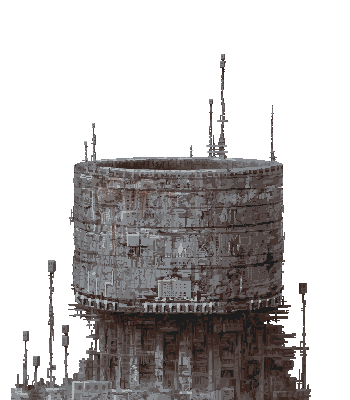
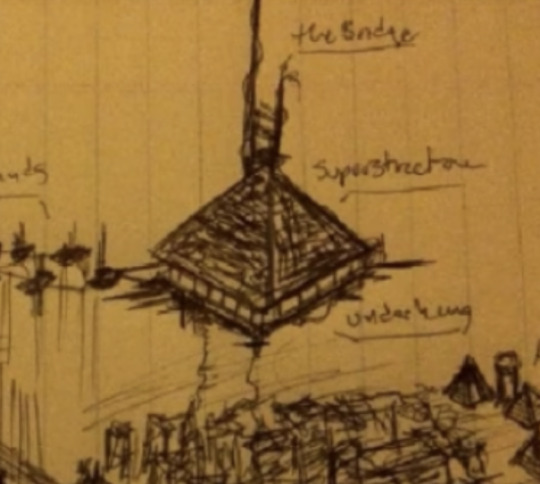
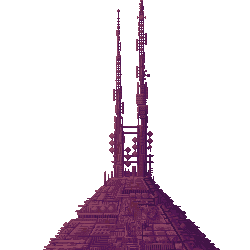
I remember before this DLC, some people interpreted iterator bricks as cylinders instead.
In the files Outer Rim also has a curving sky and a placeholder background where the earth is crumbling at the edge. And it’s literally called Outer Rim. Could also be a floating landmass, or sinking into the void sea, if you wanted to try out some other explanation. But I think that flat planet Rain World theory has some more evidence with this one. (I don’t think I can use flat planet RW for my space-involved AU but it is still interesting)


At the edge of the world...?
Someone (I think it was a reddit comment, I've been brain blasted with so much Watcher stuff that it's all starting to mix together) pointed out that spreading rot in the past doesn’t influence their future versions, so alternate dimensions aren’t out of the question. (Unless all regions are separate places - I wasn’t sure if places like Stormy Coast vs. Shrouded Coast were supposed to be the same or not. Or if the karma flowers kill the rot in the past, only for it to crop up again in the future and die again, but that seems overly convoluted.)
Time and space riftwalking shenanigans were already a lot - timelines/alt dimensions feel like quite a step further. In this case you are not following just the one “thread,” as Spinny puts it.
Final Thoughts
Initially I had a poorer reaction to Watcher's story, but some of it was defensiveness over the tone and headcanons I had come to like about RW and DP. After a few days of it settling in, I find myself warming up to Watcher more. I may have liked something different more, but I can enjoy and appreciate Watcher for what it is.
If people can differentiate the canons of the DLCs (...it might be a little easier than vanilla vs. DP, because Watcher is so fantastical), I think I can have a fun time with both.
Speaking of headcanons, giant ancients are pretty inconsistent with a lot of the environmental clues about ancient size, even the new regions within the DLC itself. I’ll post some stuff about it with screenshots and drawings later.


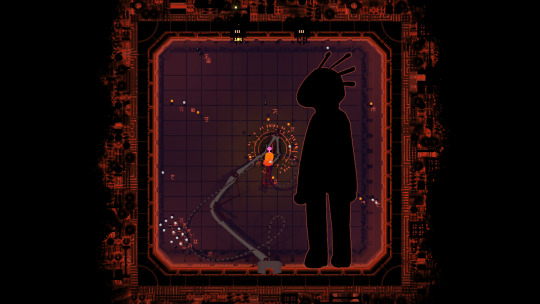
Here's a couple of them...
I think literal hand puppet iterators are a good reminder that an iterator is more than its puppet. I can really imagine them as a giant machine waving a cute toy on a stick, a form more palatable for their audience. (Although that does make Moon being stuck in the PoV of one feel a little weirder too.) It emphasizes the way ancients likely thought of them as well. The concept is just neat.
However, I don't know if I would have fixated on iterators so hard without seeing puppets as more of a proper body. The superstructure is fantastic - but the puppet avatar makes it easier to identify with them as people and characters. The puppet being completely toylike rather than closer to a body-like vessel makes that a little more difficult.
For a lot of stuff I’ve already written, especially interactions between ancient and iterator OCs, the size discrepancy is too much. So I just won’t adhere to giant ancients or tiny everything else hahaha
In general I mostly see myself using the snippets of ancient lore, region stuff, new creatures. If possible, I'd like to see what secrets can be uncovered about the new regions.
I’m not interested in using stuff like the sentient rot when it comes to the continuities I more deeply engage with. My opinions may continue to evolve over time, we’ll see. But these are my thoughts after a few days of processing.
#rain world#rw watcher#rw watcher spoilers#watcher spoilers#rw spoilers#text#images#watcher ending spoilers
79 notes
·
View notes
Text
I think one thing genuinely missing from Veilguard was court intrigue. This is of course true from the perspective of the events in game but it is also, crucially, true from the glimpses we see into Solas/The Dread Wolfs past prior to the veil coming down.
One of the most intriguing little moments in DAI is when Solas begins waxing poetic about how he missed court intrigue, politics, how these places linger with sex. If you call him on that and ask hey WHEN did you experience that, he immediately gives you disapproval. This is the closest the inquisitor can get prior to trespasser to catching him in an outright lie and KNOWING it.
Further, the dalish tales that we have heard about Solas say that he could walk in multiple worlds, and pass himself off as whatever the moment called for; that's one of his trickster aspects.
Yet in absolutely all of the visions we see in the past the rebellion is literally just fighting or breaking into a location to fight in there. The closest we get to that not being the case is breaking into ghilianhans lab but even then it's just fight fight fight the whole way through. When Solas and Elganan are speaking to one another, they frame it as them being family or siblings having an argument rather than as the sort of political rivals that I had imagined from DAI.
Part of me wonders if this was yet another sacrifice of Joplin (the original plan for DA4) which was a sneaky heist game. Joplin sounded like it would take a lead on some of its major missions from missions in the past like Wicked Eyes Wicked Hearts in DAI and Mark of the Assassin in DA2. DAtV simplified a lot of those concepts down, making the game polished in terms of technical gameplay but lacking in critical roleplay decisions which I think are more key to a game focused around politics and court intrigue. The decision to make Solas a lone actor rather than the leader of the dreadwolfs agents also slashed the chance at this; making the game the first in the series where none of the companions have ulterior motives in joining your group/none of them are lying to you.
But ultimately I do think it's sad we never truly got to see Solas act the dreadwolf in regard to court politics. It sounded like he really did miss it and it sounded like a side of him that we had only glimpsed briefly in DAI; I was excited to see it in all it's glory.
#dragon age#datv#dai#da2#i guess this is#veilguard critical#although i mean this in a more constructive criticism way#im sorta past the outright anger#and more on the 'noting down ideas for my eventual post dai fanfic' of what i think worked and also didnt work#solas
125 notes
·
View notes
Note
Do you have any Thad headcanons and Bart and Thad brother headcanons? Also ur writing is a masterpiece on ao3!
🥺Ty sm I really needed a pick up today. As for Bart and Thad being specifically brothers in a universe where Thad is 'redeemed' (it's basically the best case scenario) these are some of the things floating around I have.
1.) Thad inherited Barry's general phobia of roller coasters and heights so he will not absolutely will not sleep in the top bunk. This is just to make things absurd of course. Even when he was pretending to be Bart he would not sleep there, he slept on the beanbag chair. Yes, Bart takes advantage of this in petty revenge whenever possible, like throwing his favorite hoodie or pair of pants into a tree or the roof.
2.) To contrast Bart's inability to fall asleep before 2AM, Thad cannot keep his eyes open past 10PM. Bart calls him an old man because of this.
3.) They unfortunately get the same English class and between the two of them nearly get Ms. Dalrymple to finally quit but in catastrophically different ways.
4.) Thad gets along with most of Bart's friends, except for Mike Ringer. No one knows exactly who or when the first verbal punch was thrown - maybe Thad did first, maybe Thad was a little territorial over Helen, maybe Mike is just the same level of petty Thad is. Either way they cannot be left alone together or something is going to break out.
5.) Dox betrayed Bart by favoring Thad when he came back and was there long-term for like a month, then out of no where decided he was about as interesting as dryer lint.
6.) They actually do share a lot of the same taste food-wise and it makes things easy for everyone.
7.) The whole "Thad was a better Bart than Bart ever was" revelation tying into ableism did not leave Bart's conscious for a long time, nor did it leave Thad's, but in Thad's case it was that no one loved him for him, only because they thought he was Bart. It's a painful subject that both sort of try not to bring up.
8.) Naturally, things were a little rocky to start - Thad his own "probation" (he had to wear an inhibitor collar for a while and was under house arrest) and it was during this time that a lot of Thad's own mental health issues were addressed and the basis for his relationship to Bart was formed. That being said, Bart absolutely once hacked that collar and released him so they could get up to mischief (he just wanted to go to an ice cream shop in Brazil).
9.) Helen's status to Bart is nebulous and it definitely deviates from being nuclear (a mom, sister or aunt) but to Thad she 100% is his mom and he'll rip your lungs out if you say otherwise.
10.) Bart will steal Thad's clothes - Thad RARELY touches Bart's.
11.) Naturally they both know how to push each other's buttons and Thad has a lot more of them to push.
12.) Bart likes his side scroller video games (think Mario) the best because they are quick and instant with no load time - Thad meanwhile couldn't be more bored. He likes RPGs and decision-based RPGs that focus more on story than an enjoyable gameplay.
13.) Thad is a very good liar, Bart is a pitiful one - however Bart is always able to tell when he is lying and pisses Thad off.
14.) To complement Bart's mastery of the guitar Thad's preferred instrument is the piano. Of the two, Thad is more serious about music and actually studies it.
15.) Going back to family relationships - Max to Thad is in the same category as Helen to Bart, he is someone he is fond of but he's definitely not of any sort of nuclear relationship. Max to Bart however that is his dad and he'll rip your lungs out if you say otherwise.
16.) More family relationships - Thad feels a deep deep deep disconnect from the rest of the Flashfamily. Wally and Iris to him are strangers and he refers to Wally as "Bart's cousin" instead of "my cousin" and Iris gets a loose title of "grandma" because he doesn't know really what to do with her. In the past, when he called her "grandma" it was 100% derogatory in the same vein as calling her a hag. He can't call her that anymore.
17.) Thad is more easy to startle, fluster, gross out and generally he is more reactive than Bart is.
18.) There are very few people that can touch Thad without getting flinched away from. Helen can touch him whenever she wants and he's comfortable. Bart he has to see him touch him or he will freak out. Max needs permission unless it is an emergency and almost everyone else is a NO-NO DO NOT TOUCH.
19.) Thad doesn't want to call himself a hero, he insists he's just 'overflow' and does cape-stuff as favors or when something happens where he could be used. For overflow he sure does a lot though...
20.) School got too stressful for Thad eventually, and he just decided to drop out and get his GED. This infuriated Bart because he didn't know this was an option. For a while Bart considered doing the same thing but ultimately he decided to go through Senior year because he genuinely liked being with his friends during that time.
21.) Naturally, only Thad is allowed to say shitty things about Bart. Anyone else tries and they risk suddenly aspirating on pure citric acid or cayenne pepper.
22.) Bart and Thad didn't discover this until many years later - but when Thad came back his legal paperwork had him listed as Max's legal son through adoption, so technically Max adopted Thad first legally while Max was still just Bart's 'legal guardian'. Neither didn't know what to do with that.
23.) Yes, sometimes Wally just assumes Thad knows what that wily ol' Eobard might be up to and Thad has to tell him that he knows jack shit about him, and whatever his own "father" had programmed him to believe was not reliable.
24.) Thad definitely sees things with more nuance than Bart does and embraces a lot more shades of dark gray as viable and reasonable.
25.) One of Thad's reoccurring nightmares is having every other Speedster die and he is the only one left he therefore he HAS to take up the mantle of The Flash - this petrifies him because he doesn't want to be anyone else or wear anyone else's suit again. EVER. Wally once in an effort to be welcoming to him said that the Flash legacy was his too if he wanted it when he was older. Thad panicked and ran away :C
26.) No one knows how or why this unfolded, but Thad and Alan Scott get along as this younger queer/elder queer mentee/mentor relationship.
I have more but that's all for now!
94 notes
·
View notes
Text
I’m just thinking long and hard about the way Akiren and Akechi are written as foils for each other. Because of course, the game drives it home for us that the two are narrative foils: Akiren is the champion of free will who finds power through his friendships, Akechi represents the ways society binds us. He is chained by his desire to be wanted (importantly, by the wrong people– I’ll get to that).
At first glance, Akiren and Akechi’s point of divergence has to do with their relationships– Akiren has confidants, Akechi doesn’t, and this is the deciding factor in Akiren’s victory over Akechi on November 20th and in the engine room. Still, while this is certainly part of what makes their relationship important as a narrative device, it’s not the full picture. That, I think, has more to do with the fact that they both desperately want the very relationships that are used to foil them. They have common ground, and that’s what makes the emotional beats of their differences hit as hard as they do.
Even though Akechi doesn’t have the close bonds that Akiren does with his friends, he is defined as a character by his desire to belong. He wants to be praised and given everything he feels he was denied by Shido’s callous disregard for his mother and society’s unjust treatment of him after her death. He was a self-proclaimed “undesirable child” who spent his young adult life doing everything in his power to never feel unwanted again. He literally spells it out in his engine room monologue– “I was extremely particular about my life, my grades, my public image, so someone would want me around!”
Akiren, like Akechi, begins his character arc as a social outcast. Unlike Akechi, who appeals to systemic power to claim social clout and chase his own sense of belonging (the Shido revenge plot, which would, uhm, theoretically end with Shido acknowledging his son’s worth), Akiren finds family with other outcasts. All of the Phantom Thieves understand his struggle, and because of this they foster a sense of understanding and community that Akechi never gets to experience.
It is important to note that these bonds are deepened when Akiren helps those around him. While there’s absolutely nothing bad about doing things for the people you care about– in fact, most would argue that this is what makes a friendship a good one– we can take a reasonable guess that Akiren craves the love of those around him just a bit more than is healthy for him. He plays therapist for half of Tokyo– he stretches himself absurdly thin for the sake of his friends. That’s a bit much to ask of one person, but Akiren seems to demand it of himself. This is the nature of confidant routes as a game mechanic, of course, but hey, reading into game mechanics is important to getting a solid reading of who Akiren is behind the mask!
The crux of it is, Akiren and Akechi are both lonely characters. Their desire to be loved quite literally drives the narrative of the game, both in terms of plot and gameplay. What makes their foiling so tragic is the fact that Akechi so obviously wants what he has himself determined he can’t have. He says as much in the engine room when he questions why Akiren has things that he doesn’t, despite being (as he says) criminal trash living in an attic.
And yet, Akechi’s isolation is frankly the result of his own decisions. He is the one who chooses to work for Shido. He is the one who acts on a worldview that requires he keep his cards close to his chest to win— against Shido and against the world that wronged him— and to be considered desirable (even despite the fact that this mindset obviously works against satiating his hunger to be loved. He really needs to go to therapy, but I digress).
I don’t think Akechi even knows how to go about claiming what Akiren managed to. Akechi has agency in the actions he takes, absolutely– he would be furious about any suggestion to the contrary– but in many ways, the choices he feels himself able to make are constrained by his circumstances and the lessons imparted to him by his past.
All this to say, Akechi and Akiren aren’t different because Akechi doesn’t want teammates, or even friends. He sincerely wants everything Akiren has. He tells us this in the engine room. He shoots himself in the foot by prioritizing approval from society and love from Shido above other relationships. But thinking from inside his shoes, what else was he going to do? Where else would he have thought to turn to find what he wanted? He was dealt a horrible hand and he played his cards according to the rule book he was given. If the world were just, Akiren and Akechi wouldn’t be foils. It’s the injustice implicit in that that really drives home the point I think P5 is trying to make when it foils Akiren and Akechi in the first place. It also, personally, has been making me want to scream all day.
On a related note, this is also the exact reason that Akechi being the one to bring up that things might have been different if only he met Akiren a few years sooner makes me want to throw things, but this post is long enough. I’ll save all that for later!
#writing this has also had me thinking about the touchy topic that is ‘agency’ in akechi’s narrative#he makes choices AND he’s a victim of circumstance AND neither of those things cancel each other out#I made a post about this a while back but I think I’ll revisit it soon because again— a topic that makes me froth at the mouth#also did y’all notice I got a little foucauldian with my akechi analysis 👀#I can’t resist. maybe more on THAT later too!#anyway this is scattered and left of coherent but hey I had a lot on my mind!#persona 5#goro akechi
192 notes
·
View notes
Text
Loid Forger and Weakness (Analysis)
I was watching gameplay footage of What Remains of Edith Finch and towards the ending I thought about the idea of memories, and one thing led to another and I thought of Spy x Family, specifically Loid. It made me wonder if he ever did confront his past and what exactly weakness means to him.
(These thoughts may not be organized since it happened so late at night but bear with me.)
Initial Thoughts
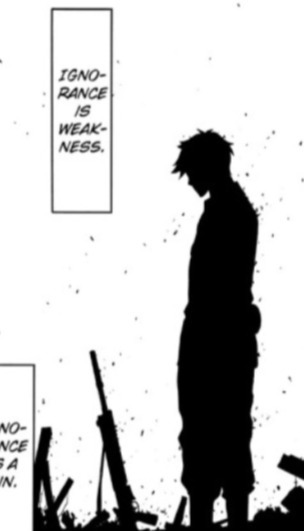
I always thought about being taught that the idea of, "you have to be strong" which often goes hand in hand with this idea of "you can't show emotions". I feel like Loid constantly tells himself he can't be weak, buy what does that mean if his idea of being strong is to not show any emotion?
Memories
I don't believe it being so long ago is the reason he doesn't remember his parents faces, I want to believe he purposefully forgot what they looked like, and this probably applies to his actual name too. His home was destroyed, any and all photos of his family were lost in the debris, he burned his identification papers so there's also no record of him ever having existed. He said it himself that there is no one left who knows his name.
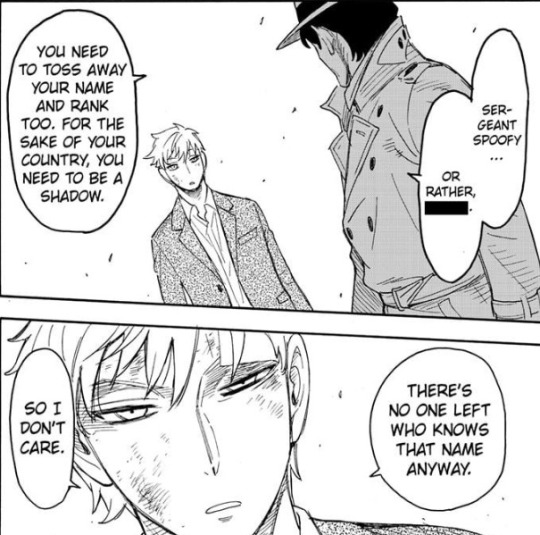
I should also mention how he remembers the faces of his friends and croquette lady. Loid remembering his friends faces are a given since he believed they had died during the first bombing but he later reunited with them when he was a teenager, only to lose them during a botched military operation, leaving nothing behind but dog tags.
While it may be random to include the croquette lady I feel that remembering her face is still significant given that she was the last person he spoke to before the bombs dropped, as well as being the first casualty he saw.
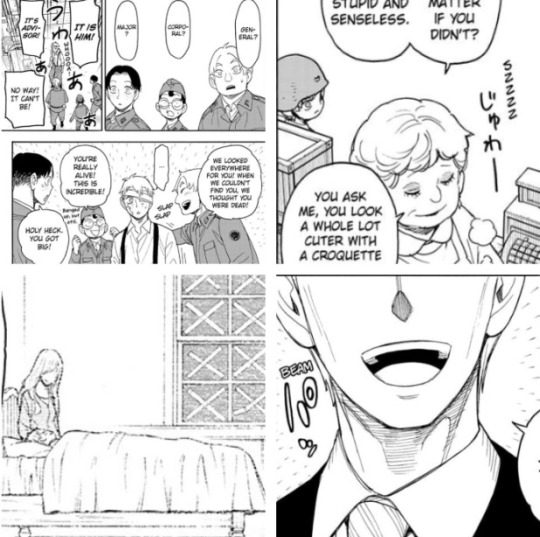
Memories (continued)
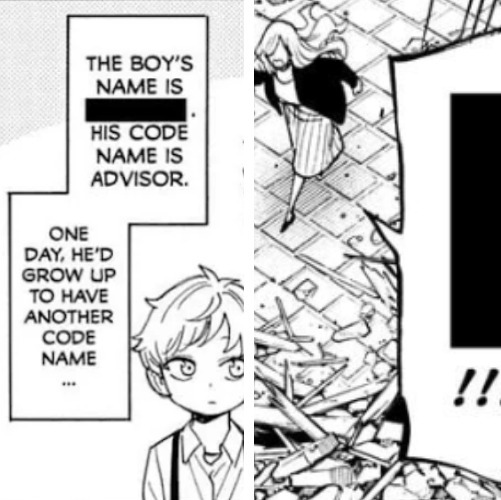
It may not mean anything but find it interesting that his name is hidden like this, maybe I'm thinking it about it too much but it's almost as if it were blocked out, much like how classified files have certain sentences edited out because of their sensitive nature. If he had forgotten his name it liked would've been blurred but instead it's redacted, this paired with not remembering his parents faces, it's almost as if he made himself forget, but why?
Weakness
I think his parents faces specifically his mother and his actual name are all that connects him to who was before, he likely still remembered up until he joined WISE where he was possibly taught to let go of the past, not because they didn't care about what happened to him but because it likely would've had an impact on his work, and he passed on that same mentality to Fiona, about spies not showing emotion, to stay alert and not be ignorant, because to him those two things are what make someone weak.
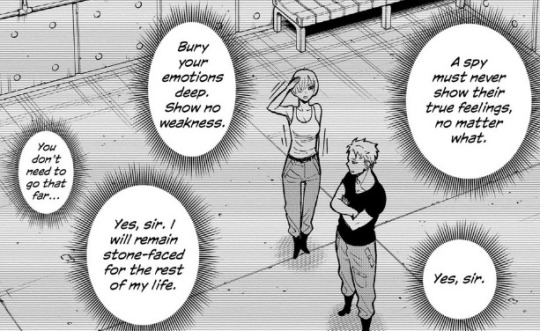
I find it interesting to believe that Twilight wasn't always this way but rather he adapted his own experiences and the mindset he was taught into him and realized that his emotions and overall ignorance is what led him to participate in a war, without even knowing why. The reason he did so was because of those weaknesses and that he needed to discard them. So it's no surprise that during his fight with Wheeler, but mostly Yuri, that he came to terms with the fact he's getting weak, because instead of doing what he would normally do if it was anyone else, he instead chose to spare him. If he was the Twilight that he was prior to Strix then he absolutely would've killed Yuri because he wouldn't have any reason not to, but he does, and in doing so that decision to spare him almost cost him his life.
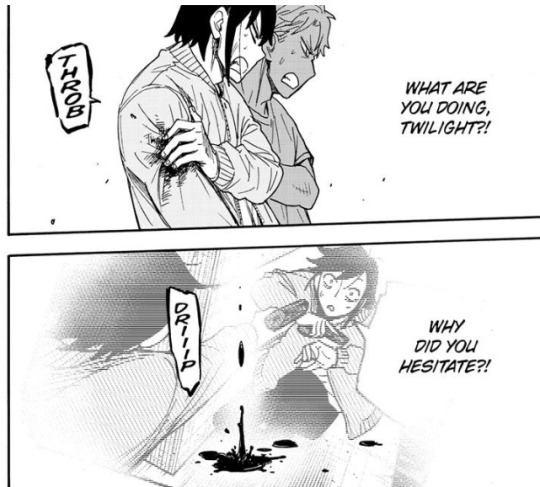
"You're getting weak"
It all comes to a head when he recalls the event, he acknowledges that Wheeler is for lack of a better word, perfect. Someone that he himself used to be but somewhere along the away something changed. Twilight acknowledged that he was getting weak and the source of that weakness, was his small but still very present feelings for Yor, if those feelings weren't there and if Yor was just another person to use for the sake of the mission, then he wouldn't have spared Yuri but he did, for her sake.
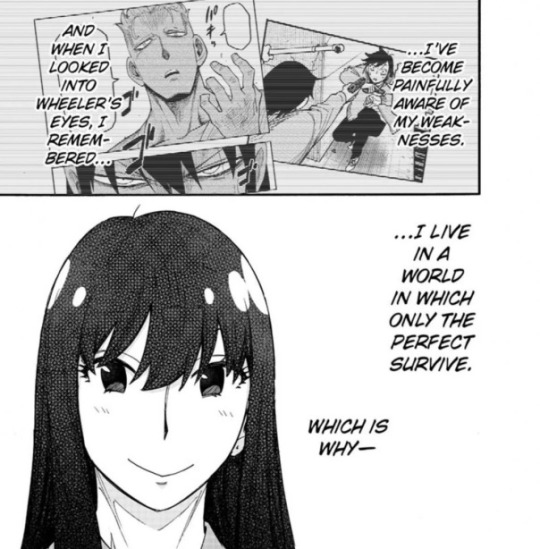
While he may have been thinking about doubting himself while thinking about the encounter with Yuri I believe the panel still holds some weight, Loid knows he's starting to slip up and this time was too close of a call, he knows he's experiencing.
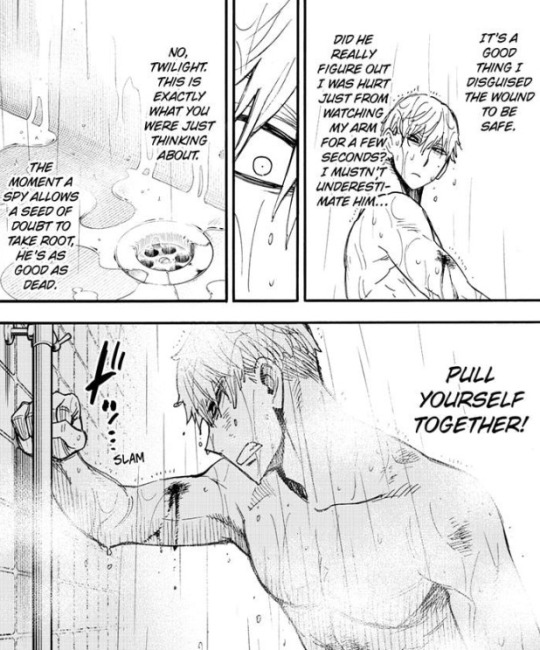
It may have happened long ago but it still relevant to how Loid is as a character thus far, that being Fiona's observation that his smile had a shred of genuineness to it when she visited, that bit of emotion being a result of spending time with his family, and learning to form connections again so it's only a matter of time before he actually expresses his own emotions directly in some capacity.
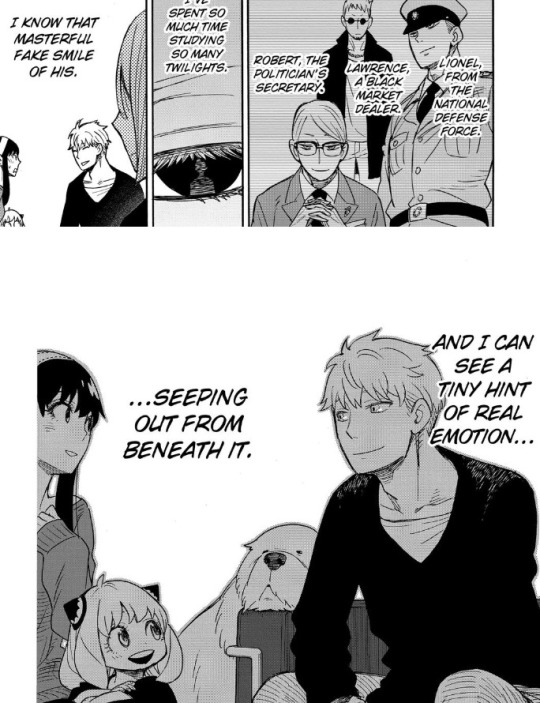
Closing Thoughts
This entire post came as a result of What Remains of Edith Finch, which I highly recommend people play as it has a nice mystery element to it as well as its overall themes of death and memories and being presented in such a unique way. The concept of keeping your emotions hidden and locked away is something I relate to which is all the more reason as to why I'd like to see Loid be more open about the way he feels or genuinely breaks down and lets all those bottled up emotions out, allowing himself to fall apart be vulnerable around people, specifically his family. There's this really nice artwork I saw once of Yor and Anya hugging a child Loid, and I always thought that externally Loid is a grown man but internally he's a child wanting someone to lift him up and tell him, "it's going to be okay".
#spy x family#loid forger#sxf#spy family#sxf manga#twilight spy x family#yor briar#spy x family meta#JrsRant#spy x family analysis#yuri briar#yor forger#spy x family spoilers
147 notes
·
View notes
Text
Analysis on HoldBreath & Breathing in Deltarune (chapters 3+4 spoilers ahead)

Holding your breath comes up in both chapter 3 and 4, as well as the spamton sweepstakes... So does the more general notion of breathing. We even SEE kris, despite being a pixel sprite, breathing on at least two occasions, and we're told once more by susie that they're breathing heavily if you think about Noelle during a weird route in chapter 4. so Kris has a lot of relevancy to the idea of holding your breath, but so does Noelle, who holds her breath to brave intense emotions when discovering video game secrets.

I think holding your breath might relate to the idea of going darker than dark, as the only time anyone really HAS to hold their breath is when they're underwater... which we've seen that ocean imagery relates to Dark Worlds and the game as a whole multiple times by now

Darker than Dark
to that extent, i think we can speculate on the act of going darker than dark in the context of the game experience. i think of the device theory ruling that we can go even deeper into layers of "fiction"... then we've got IMAGE_FRIEND who seems to exist in the darker than dark and we largely only encounter it in gameplay when we catch it in out of bounds areas or find it in "video game secret" areas you need to unlock and play very specifically and intentionally. that is to say, the "darker than dark" where you can "start to see things" that ralsei cautions about seems to be at least ASSOCIATED with hidden off-the-beaten-path fights and secrets in video games... like the eggs from the forgotten man.

its also unclear if Kris "remembers" our encounters with the Forgotten Man behind the tree after they happen. of course we the player remember these experiences outside the game. but there's a possibility Kris is forgetting as the forgotten man seems to say they do. I'd also go as far to say that there's a chance Kris AND Noelle have BOTH encountered the Forgotten Man, and that he's also behind Noelle's strange unreplicable ability to encounter video game secrets? especially because one of those secrets literally has to do with eggs?


Kris' Struggle for Autonomy and Control
finally, i also think the use of holding your breath as an act also relates to the themes of control and autonomy for Kris.
breathing is a form of expression for Kris. they display fear visibly to the player when they're breathing heavily, and this is how we come to understand how Kris feels about what we're making them do and what they're seeing. we can command Kris in a lot of ways, but we don't command them to breathe... they just do it. they breathe autonomously and automatically, as any living, breathing thing would... it becomes a shorthand for their limited autonomy - something the player shouldn't and doesn't have a say over (as part of our Video Game Experience... it would suck if we had to command Kris to breathe - and we know to some extent Gaster/the narrative is treating this as a game program we are engaging with).
they take "deep breaths" when thinking about susie, both before praying for her and playing the organ.


Susie is the ultimate embodiment of autonomy in deltarune. she does not want to relinquish control to anyone but herself - especially in the early chapters she overrides the player's decisions and speaks for herself. Kris taking a deep breath when thinking of Susie twice in the same chapter is a specific image... to take a deep breath is the opposite of holding your breath. the act of taking in air becomes a way of expressing their autonomy in susie's wake. ESPECIALLY during the organ playing scene.
Ultimately, when we command Kris to hold their breath, we also take the most guaranteed living action away from them. we command them to not do something, to not breathe. I think there's something to be said about taking breath away from Kris in terms of their struggle against us, even when we don't do the weird route, or we act as benevolently as possible towards them, we also know they're terrified of being a puppet on our string and they want control. imagine a higher being telling you to hold your breath. imagine the feeling of knowing something or someone could force you to hold your breath for as long as they want... until they use you up.
To breathe deeply on your own vs. to hold your breath and go darker than dark..... i think the full picture will come into view when we know more of where kris' head is at and what their goal is.
#deltarune#deltarune spoilers#darker than dark#deltarune theory#deltarune meta#deltarune speculation#holdbreath#shadow mantle#image_friend
47 notes
·
View notes
Text
Thinking about it, Elise's character had it all to be an "antagonist" or to be morally grey:
She had a tragic past, including the loss of beloved people to her (her parents). Their deaths affect her even 10 years after.
She had a somewhat "complicated" relationship with her father. In the game it is not directly established that she doesn't like him, but it is very clear that she holds complicated feelings about him . In the scene where she ressurects Sonic, she describes her father's plan to change time as a "sin". (also all my elise homies dislike the Duke so you get it)
Elise is lonely and sad, which is the easiest path to wake up Iblis.
Elise technically has lost everything, she lost her family and she is doomed to live a life shutting her emotions forever in order to protect her people.
When she met Sonic for the first time, she asked him "why was he saving her", implying that, people only care for her status as a princess, and she is not used to be cared for who she is. Or maybe that's my interpretation. She seemed very uninterested on Sonic in the beginning, while Sonic was flexing in front of her while killing Eggman's robots😎😎
The scene in the beginning where Elise has a vision of Iblis waking up and destroying the city, she appears flying, looking at the kingdom in a serious way. I think it's interesting that she's portrayed like that, instead of portraying her with an afraid look on her face . To me, it implies that Elise's knows that Iblis is inevitable and that there's nothing she can do other than accept such devastating fate.


I think it says a lot of her that despite all of this, Elise always stood for the good. She loves being a princess and she loves her kingdom, even if sometimes she wishes she could be just a normal girl. She has heroic traits as well, and in my opinion, is it one of the reasons why Sonic is interested in her, as Sonic himself is a hero and does good in a selfless way.

"It sounds like being a princess is not that easy"
He clearly shows admiration for Elise's strong will, and it definetly makes a contrast on Sonic's physical strenght. I think it's also interesting that in this game, Sonic helps Elise not only by rescuing her from danger, but also by listening to her, for trying to make her feel better and not judging her for having emotions that others might deem as "selfish" or "not proper from a princess". This is what makes Elise to take the right decision to blow the candle to go back in time, because thanks to him, she knows that they will always be friends even if they are apart, and that she always will make the right decision. She is princess, and Soleanna matters the most to her. She saved Soleanna and the world just like all of the other characters in her own way, by having a strong heart.

Say whatever you want about Elise "being a damsel on distress on the whole game", but narratively? Her being a princess is an important part of the plot, because if she didn't loved being a princess, if she didn't loved her people, Iblis would have destroyed the world years ago. (I do agree that the rescuing elise part could have been handled better at least on gameplay terms, but dismissing her importance as a princess to the plot and reducing her to a mere damsel in distress is so innacurate). It really takes strenght to be like that, and to be able to protect others.
#princess elise#sonic 2006#sonelise#your honor i love her#it's 2025 and their dynamic still interests me so much and I love it even much more!#I don't think Elise is “selfish” at all but I do still appreaciate the writers to have her express her emotions as a normal teenage girl#And even when she cried and Iblis woke up Sonic didn't judge her#I think it's somewhat meaningfull that she is not a perfect princess and that Sonic had seen her most low moments and still believed in her#She always tries her best despite having every reason not to and that's why she's great to me#And I says this as someone who particularly prefer morally grey characters over heroes#anyway elise my beloved
52 notes
·
View notes
Note
Hey there! I just say your post about dungeon crawlers. I was curious about your second bullet point, "Dungeon-crawling challenge games actually kind of own if you're willing to engage with them on their own terms! There's a lot of potential for cool gameplay if you let go of silly reductive notions like "roleplaying" being just being when you play-act your character or social interaction!" I was curious if you'd mind telling me more about how you feel roleplay should be handled in these types of games. I am genuinely interested to hear your thoughts. :)
Okay, first of all, I have a very broad and admittedly circular definition of role-playing (in the context of role-playing game): role-playing is when you're playing a role-playing game.
As said, it's circular, but ultimately, throughout my years of playing role-playing games I've found that all other definitions are unsatisfying. To conclude that role-playing is the parts where the mechanics aren't used (the roll-playing and role-playing dichotomy) implies that mechanics are somehow inherently contrary to a good role-playing game experience, which is simply untrue, because good mechanics can actually enhance the narrative! Saying that only the social parts of play are role-playing undermines the fact that players will be still making decisions for their characters in various other situations where the personal and emotional stakes can be even greater than in social situations!
Ultimately, role-playing games as a medium are defined by the possibility space, and specifically that possibility space being near infinite. There's an old line I keep bringing up from some painfully twee eighties RPG ad which goes like "Role-playing games are like board games but you can move outside the board!" and ultimately that is the thing that defines a role-playing game. It's a game where the players collaborate in a shared fictional space to produce cool little narratives although sometimes the cool little narratives aren't the point but it's literally like a lil challenge that the players try to overcome by interfacing with the fiction and engaging with the mechanics.
To tie this into dungeon crawlers: even a traditional dungeon crawler is ultimately a role-playing game because it has the players engaging, via their characters, with the shared fiction, sometimes mediated by the rules. A lot of people assume that a dungeon crawler must mean that the gameplay is nothing but a meat grinder, but this is actually ahistorical and not actually reflective of how old-school dungeon crawling RPGs play out!
Even the most basic dungeon is still a location in the setting it's part of, so there is plenty of narrative content to be found there. The characters might just be motivated by greed, but there is plenty of narratively satisfying content that can happen in the pursuit of that goal once one accepts that there need not be a linear narrative where the characters must hit certain story beats, but the story itself can just be "the characters went into a place, explored, interacted with the locals, found out some secrets about the dungeon, fought some monsters." That is still role-playing.
None of this is to say that the play-acting part of play (which I sometimes call characterization) is in any way bad: in fact, it can very much enhance the gameplay. But that is in and of itself not the end-all-be-all of role-playing!
Anyway role-playing is so much more than describing your cool elf kissing other cool elves, it can also be your cool elf finding a cool sword in a dungeon and giving it a name. Dungeon crawlers kick ass because the GM can craft a whole narrative about how the dungeon used to be and then reveal it slowly to the players through their characters finding fantasy audiologs and that is already narratively satisfying in and of itself!
96 notes
·
View notes